#also i know griffith is evil but consider this: me inside of him. that's all thank you
Explore tagged Tumblr posts
Text
ohhh babygirl i knew berserk had a lot of phallic sword symbolism but i wasn't actually expecting it to be like. every three fucking shots. oh wow
#also i know griffith is evil but consider this: me inside of him. that's all thank you#keeping him pregnant and barefoot around the house so he has no time to plot and scheme etc etc etc#NO i hadn't watched berserk yet even though it's one of my friend's favourite#which is why we're watching together <3 love language#mine#the gremlin watches anime#i also don't like that the anime only ever slightly hints at guts being sexually abused#when apprently in the manga it's much clearer to the point of it having like actual panels of child guts naked or something#yeah... that's fucked up and it's also the reason for big sword = manly and whatever#i actually really do love phallic symbolism in media it's just that i wasn't expecting it to be like. in every fucking scene lmao#don't mind the tags as something too serious btw this is written very lightheartedly i don't want to go into deep analysis just ywt
4 notes
·
View notes
Text
Dark Cybertron Chapter 1: Welcome to Comic Event Hell
You know what readers love? When the stories they’ve gotten invested in over the course of a couple years get interrupted for some pseudo-crossover bullshit.
And you know what writers love? When the story they’ve been crafting over the course of a couple years get interrupted for some pseudo-crossover bullshit.
Did I say love?
Because I didn’t mean it.


“Dark Cybertron” was penned by John Barber and James Roberts, with collaboration with comic writer and artist Phil Jimenez, and was published from early November, 2013 to late March, 2014. Atilio Rojo, James Raiz, and Livio Ramondelli did the art, each responsible for scenes in specific locations, with Robert Gill filling in as needed. Alex Milne, Andrew Griffith, and Brendan Cahill would also contribute pencils to the first issue and the back half of the series. It was a celebration of the 30th anniversary of the franchise, and the second birthday of Phase Two... which went on for over four months, but never mind that!
Both "Dark Cybertron” and its preliminary materials were made to go alongside the Transformers: Generations toy-line, each issue being included as a toy pack-in with whatever character was being featured… or, at least, that was the plan. Sometimes it didn’t work out. Regardless, this storyline was created to sell toys directly, as opposed to the MTMTE/RID series being made to sell toys more through the power of suggestion. It’s a small distinction, but important, because it will help explain any lack of soul one may perceive while they read “Dark Cybertron”.
“But Hannz!” you cry out, reaching to grab me by the throat and shake me like a rag doll, because to you I’m merely a faceless voice on the internet. “Surely by calling this specific storyline soulless, you’re completely ignoring the very nature of this franchise that you’re almost uncomfortably invested in!”
To which I’ll say this: look, I’m pretty realistic about where my giant space robots came from; Transformers as a franchise would not exist the way it does without Ronald Reagan introducing the Free Market to literal children and fucking up how we interact with media for the rest of time. There is no ethical consumption under capitalism, and that rings especially true when I’ve got a Spinister on my bookshelf staring me down as I write this, that was likely made out of plastics which either involved blood oil or unethical labor practices, if not both.
However!
The choices of a company to have their comic license holders to cook up an entire plot that derails what they’ve already got planned out for toy tie-in comics is a completely different animal than what IDW had had going on up to this point. Phase Two had been about exploring different ideas that hadn’t been able to be explored during the war, and seeing what happens when you take away a third of the logline for Transformers G1 as a whole. Being a part of a brand of toys was almost inconsequential to how the stories were being told; even the Spotlights, which were also toy tie-in comics, had plenty of charm to them, if only because there weren’t quite as many constraints placed on the writers, and they were stand-alone issues.
Of course, being tie-in comics isn’t the only reason that “Dark Cybertron” is a bit of a slog, considering everything IDW itself was trying to get done within this storyline, but we’ll cover the publishing company’s/Simon Furman’s/Transformers’ tumultuous relationship with the concept of gender identity and expression later on, when it becomes relevant to the story proper. This point also ties into the interesting origin of Windblade, who we’ll meet in a few issues, and what happens when you let your fanbase have a taste of power and forget that people might like to see themselves represented in the media they consume.
“Dark Cybertron” is what ended up making me stop reading MTMTE the first time I tried it in 2015. A big part of it was because it forced the reader to need so much information from RID and even events prior to Phase Two, it wasn’t very fun to try to parse what was going on, on top of the writing beginning to flag because of obvious constraints to what Barber and Roberts could actually do, both within their deadlines and the rules put in place by their higher ups for the event.
“Dark Cybertron” is the result of the sort of executive meddling that kills reader enjoyment by requiring writers to cram their two worlds together as quickly as possible, without the option to go for nuance because there simply isn’t time. The reason we have four separate artists for the front half of this story is because Milne and Griffith didn’t have time to draw both their current workload and “Dark Cybertron” at the same time... but sales probably went up due to the nature of how the story was published, so I’m sure they didn’t really see a problem with it.
That’s a general “they”, not a Milne and Griffith “they”.
In short, we’ve got license contract obligations, fan-poll obligations, and gender stuff fighting for space within the next 12 issues, which will be published in the span of roughly four months. Things are probably going to be a little bloated and sloppy.
Regardless of any of these points, this is what we’ve got. It’s not like it’s all bad- “Dark Cybertron” has the benefit of being written by two people who had been working closely before it had even been conceptualized. Barber was the senior editor for MTMTE, and IDW as a whole until he left in 2016. It also isn’t a proper crossover- y’know, where two completely separate titles get mashed together for a bit. MTMTE and RID exist in the same universe, just have their own things going on, so a decent amount of things still carry over without you needing to have read every single thing in both. The writing, while not quite up to par with pieces that had more creative freedom and breathing room between scenes, is still recognizable as being Barber and Roberts’. Their voices are still here, they’re just strained under the weight of everything that has to be said inside of 12 issues.
With all THAT out of the way, let’s dive in to Dark Dawn: Dark Cybertron Chapter 1.
We get a quick rundown of the most basic information you’ll need for this entire story to make sense, as we reintroduce the fact that Shockwave is an ecoterrorist with more agendas than a daily planner factory on meth, and also that he grows magic crystals. I don’t care what he says, the Ores are fucking space-magic. If you don’t want to read through all of RID for everything else, please see Robots in Disguise (2012), #1-22- A Recap, For Reference Purposes. We also get a quick rundown of the Lost Lighters’ deal, as Swerve potentially has a meta-episode.

Be careful what you fucking wish for, bucko.
Our story proper starts with a flashback to the shittiest road trip Cyclonus ever went on, as the Ark 1 finds itself at the edge of a mysterious portal. This is likely why he wasn’t super thrilled when the portal to Luna 1 showed up- portals are probably a touchy subject for him.

Jhiaxus doesn’t know what this portal is- surely this means that science has failed us, and it’s time to call in the religious crowd to try and suss out what’s going on here.

It’s moments like this that make me wonder what exactly happened in the Dead Universe that made Cyclonus’ cheek meat just pack up and leave.
Now, we know that Cyclonus is correct here, because we as readers have more knowledge than the characters at this point, but Jhiaxus tries to write off this theory as hogwash, because he is a man of rationality and science. This is a slight removal from his character in the present, whose most notable traits seem to be a lack of ethics and screaming.
Everyone here seems to be slightly different from their current iterations, actually; Galvatron doesn’t say a word as he steps between Jhiaxus and Cyclonus, only using his body to communicate that the scientist might want to back off. Cyclonus himself is certainly the wordiest we’ve ever seen him to be, droning on through his actual thought process before he comes to a conclusion on what exactly they’ve found. Compare this to the Cyclonus of today, who only deigns to grace everyone with his voice if they outright threaten him, have something he wants, or are Tailgate. If he were to ever pull this verbal meandering on board the Lost Light, people would probably assume he’s having a stroke.
Nova Prime- you remember him, don’t you?- gives not a fuck about the Dead Universe, only what it means for him personally. And what it means for him is more locations to subjugate, because he is cartoonishly evil. His character is the least removed from his present-day iteration out of everyone. He tells the crew they’ll be getting a little closer, only for the portal to do the work for them, by way of dark energy tentacles.
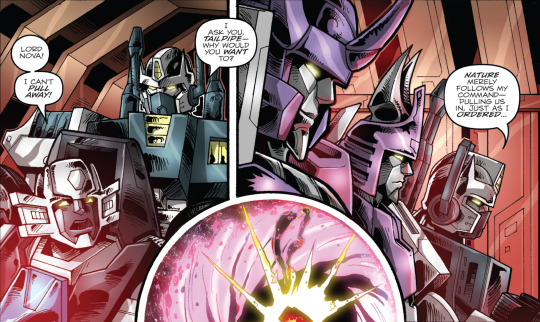
Wow, the pilot for the Ark 1 really is just straight-up named Butt, isn’t he? And what the fuck is that face you’re making, Cyclonus? Are you- oh my god, are you emoting? Oh my god, he’s emoting.
As the Ark 1 is pulled to its doom, Jhiaxus makes a quick phone call to Shockwave to tell him he’s his favorite, and to keep up the good work.
In the present, Shockwave reflects on just how friggin’ long this whole ordeal has taken. Fortunately, Waspinator and the Titan are almost here, and he can hardly wait.
Not, uh, that he’s got emotions or anything. It’s been established that he doesn’t have those anymore. Is impatience an emotion? Does that count?
Shockwave seems like he’d be really frustrating to write for.
Anyway, the Titan shows up, the Ore inside him and the Ore in the underground Crystal City combine, and the Titan starts screaming because everything hurts. Shockwave’s about as thrilled as he can be about the situation, given his lack of emotions.
Above Crystal City, we finally get back to that nonsense about the early sunrise, as someone- maybe Starscream, given the color of the narration box- waxes poetic on the planet of Cybertron, wartorn and wild in its rebirth, ruled by paranoia that has nothing to bounce off of, and so creates its own walls.
Then we get a detailed shot of Rattrap’s mug, and the moment is broken.
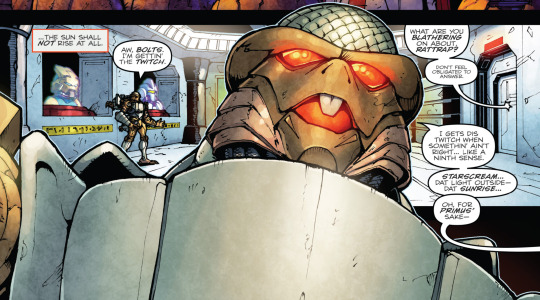
Rattrap’s character is a lot of fun in everything he gets tossed into, but you’re a goddamn liar if you think he’s pretty to look at. You are lying to yourself, and I won’t apologize for saying it.
Starscream walks out of his room in his hot new body, feeling fine and ready to take on the world. We’ll check in on him later in the day to see how that positive mentality is working out for him.
So, the sun hasn’t moved, and it’s way too early for the sun to even be up right now. That’s weird. Because I guess he didn’t know how the sun works, Starscream’s only just realized that this is perhaps a problem. He does some computer work and realizes that this is indeed a very bad thing, and asks that Rattrap call the Autobots. Not the ones who fucked off into the wilderness, the other ones. The gay, space ones.
Up in space, Orion Pax and his pals have found themselves in dire straits, the collapsing Gorlam Prime sucking their ship back down as the Death Ore consumes everything.

That’s not how engines work! And I think it really says something about the “Prelude” issues that I completely forgot why Wheelie was down an arm for a solid five seconds.
It turns out that Orion was the narrator the entire time, which I should have known- since when is the once and future Optimus Prime not the primary voice in any media he appears in?
It’s looking rough for the fellas, but luckily we’ve got to get the plot rolling, so the Lost Light VZZZZTs into existence and picks up the Skyroller to place it gently into its belly.
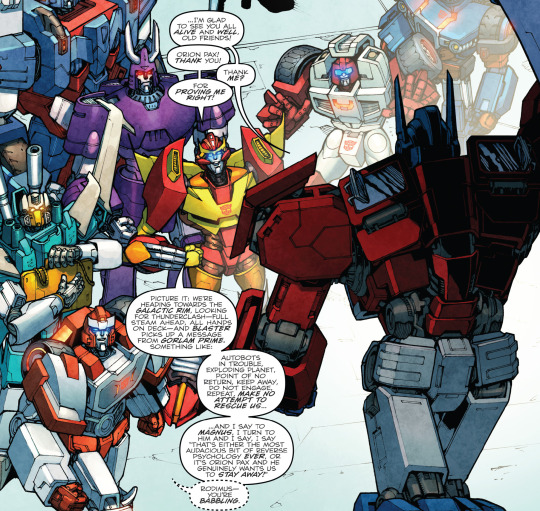
Orion isn’t exactly jazzed about the fact that Rodimus didn’t listen to what he told him, not even bothering to thank the guy for saving his life. I say y’all keep going on your Thunderclash Quest and leave this ungrateful loser behind. No space yachting for you, Orion.
The rest of the Pax Posse enter the Lost Light proper, and Hardhead reveals that he nearly joined the Quest, before he saw who all would be coming with, while Garnak has a tearful reunion with Rodimus. The fact that he’s calling him Sir- which I don’t recall him doing in Transformers (2009), at least not in a way that seems reminiscent of an unfortunate Antebellum Period Romance- feels rather weird, but I’m glad someone’s fucking happy to see Rodimus at least. Ultra Magnus asks Orion if he’ll be assuming command of the vessel, as Rodimus tries not to look horrified by the thought alone, but fortunately Orion’s not going to pull his “I’m Optimus Prime and I Can Do What I Want” Card just yet.
Smash cut to the bridge, as Rodimus tries to make himself sound competent, when Starscream calls. Orion doesn’t like that Starscream has their number, Perceptor almost reveals the fact that this ship technically doesn’t belong to a faction, likely due to being purchased after the war, and Cyclonus gets brought in for his professional opinion.
As it turns out, that early sunrise isn’t a sunrise at all, but a portal to the Dead Universe. This is a problem, because the Dead Universe really sucks, and you don’t want to go there, especially if you enjoy being alive. Orion seems more concerned about the fact that Starscream is ruling the planet, and Bumblebee is nowhere to be found.
Speaking of Bumblebee, he and all his camp buddies are psyching themselves up for a confrontation.

Swoop, please, this is hardly the time for crudeness.
The Dinobots, sick of Bumblebee’s dithering about, decide they’re going to fight the fucking sun and gear up. Prowl, though generally disliking their brand of problem-solving, does share his begrudging respect of their can-do attitude.
Their can-do attitude over fighting the fucking sun.
Then an earthquake happens and the ground rips open to reveal that Titan that Waspinator showed up with.
Shockwave takes over the narration at this point, and we get artsy, as we see events that haven’t transpired yet over musings on the nature of... time? Maybe? It would be in line with Roberts’ go-to topics, but honestly the whole thing’s kind of vague so I couldn’t give you a solid answer. Shockwave gets awfully introspective for a guy who shouldn’t care, I know that much. The point is, he is inevitable and is super good at logic and science.
Also, Nova Prime and Galvatron are back, which is cool, I guess. Not sure where Galvatron had gotten to exactly after the events of “Chaos”, but he’s back now, so it doesn’t matter too terribly much. Shockwave serves them, which we’ll probably get an explanation for at some point.
God, you can practically taste the desperation to pin all these plot points together before the entire thing implodes on itself.
#transformers#jro#dark cybertron#issue 1#maccadam#Hannzreads#overthinking about robots#incoming analysis#text post#long post#comic script writing
87 notes
·
View notes
Text
Glorious, Before the Burden - The Mourning ~ 8
I’d hardly had a moment to settle into my new home when my first gift arrived. Crying myself to sleep hadn’t worked, not that I’d expected it to, so I was in the small garden - staring up at the night sky when I felt it - a shift like a whisper. Turning around, there it was - a small casket, but I could feel her magic around it - Frigga’s magic.
Tempted to ignore it, or better yet to destroy it, I took a deep breath and reconsidered. Perhaps this was a peace offering. Frigga had been like a mother to me for far longer than she’d been an enemy - so I crouched in the soft grass and reached out, smiling despite myself at the warmth coming off the wood. So like her, as if she was in the garden with me, waiting with her arms open.
Inside, when I opened it, were my dearest belongings - books, jewels, nightgowns - along with enough Midgardian currency to be comfortable for, well I’d have to do some research on how long I could make do with it - and tucked underneath it all was another letter.
Sigyn ~
I know that what I’ve done is unforgivable. Taking away a part of you that is ingrained in your very fiber to keep a peace within my OWN marriage isn’t something I took lightly, not when I know that it will keep you separated from YOUR love.
When I told you that Loki was many things, but never malicious, I wasn’t lying - I still don’t think I am. Being led astray can happen so easily, especially after not being given the truth - and I did tell you how admirable your honesty was and still is - how your husband’s family should revere you for it. Instead you’ve been punished harshly and by me.
As I’ve said, I don’t expect your forgiveness. I’m sending along your things, not all of them at once, since the Bifrost is still inoperable. It took immense power to send YOU, much less these items - but I will try to send more, as time and magic allows. I do hope that you find solace, if not peace where you are - no matter how inconstant that may sound.
He’s home, a prisoner for his crimes, but he IS home. And I’m only allowed to visit him through illusions. Home, safe, alive, caged - and grieving the loss of you.
Frigga
I didn’t understand. Most of her words made sense - she was trying to make amends, while admitting that she chose the lesser of evils - my banishment and the removal of any possibility of Loki finding me, should he somehow escape his imprisonment for whatever crimes he committed, but the last part confused me.
Loki grieved the loss of me. The husband I knew and loved would never simply give up on me because he was locked away. He wouldn’t have taken the news that I was banished - even if they refused to tell him where and that they’d removed the ease of his usual course of finding me - and feel defeated by it. To grieve me, to act as if - NO. The feeling of suffocation kept hitting me, and it seemed to always originate from Frigga’s hand.
The ONLY way I could think of for Loki, my husband, to GRIEVE my loss, to feel defeated by it, and to give up - was if they told him I was dead.
I’d been in Midgard days, mere days, the casket having arrived the night of my arrival and I had unpacked it - put away my things, including the hair picks that Loki had given me and even gone out among my new neighbors to find food and drink, and also add to my wardrobe - magic was wonderful, but I wanted to see precisely what I was supposed to be wearing. I contemplated burning Frigga’s letters, but I couldn’t bring myself to do it - these parchments with the dark ink written in her hand, were the ONLY fragments I had left of her. And even after everything I’d gone through - she was my teacher and my mother.
I was in the cottage, one of my favorite books open and a cup of tea next to me where I’d curled up in the chair that I’d claimed as my most comfortable when a knock came to my door. Thinking of all the very kind and rather personable Midgardians that populated the small village I’d landed in, I marked my place and got up, checking the ornaments I’d added to the twist I’d put my hair in - Loki’s warnings about safety loud and clear now that I WAS living in Midgard.
Looking out the lacy curtain that covered the glass portion of the door, I saw a tall, dark man wearing leather and sporting an eyepatch that brought Odin to mind. My confusion grew, but then he flashed a smile and a golden badge. “Director Nicholas Fury, ma’am,” the door stayed closed as he spoke through it. “I’m with S.H.I.E.L.D.” I waited for him to give me further explanation. “That stands for the Strategic Homeland Intervention, Enforcement, and Logistics Division.” Blinking at him, his smile didn’t falter. “As an Asgardian who crash landed in the middle of nowhere-shire England, I think you should let me in.”
Asgardian - I sighed. He knew. Unlocking my door, I turned the knob and stepped back to allow him entry. There were others, I could see, ringing my little cottage - “Could you please, ask your -” I groaned when I noticed one of the men stomping through one of the bushes. “Please, don’t destroy the garden!”
Director Fury raised his eyebrow at my tone, but glanced outside and shook his head. “Guys, stand down!” He sounded bored. “I apologize, Miss?”
I glanced up at him, and then back to where his people were starting to retreat - I waited until I could assess the damage and once I was satisfied it wasn’t beyond repair, I returned to the topic at hand. “Miss what?”
He looked bemused. “Your name?” I sighed. “You dropped out of the sky in a flash, three days ago and - let’s just say that’s cause for concern.”
“Why?” I stared up at him. “I’ve done nothing wrong.” Aside from the compulsion to get the cottage, which I have paid for - once the casket came from Frigga and I COULD pay.
He studied me as if he couldn’t decide if I were lying or if I were ignorant. “We had a situation -” Pulling one of the tiny boxes that all my lovely neighbors had held when I first woke from his pocket, he pressed something and then turned it so I could watch -
So I could watch Loki, my Loki run amok - I watched, but I couldn’t believe it. He wouldn’t - he would never - Loki wasn’t cruel. He wasn’t hateful or - Seeing him remove a man’s eye, watching him force a crowd to kneel, witnessing the destruction and ruin - I realized he COULD and he DID.
“You didn’t know?” I couldn’t breathe, why couldn’t I - “WHOA,” Director Fury caught me, and then I was sitting in the chair, he was kneeling before me. “You are VERY pale -”
“I -” gasping wasn’t helping. Why was the air too thick? “He -”
“You know him?” I shook my head, no, I didn’t know HIM. Not that Loki. “Are you -”
“Oy, who’re you?” That voice, why was it so familiar? “What’re yer doin’ in ‘ere?”
“Now wait a minute,” Fury was on his feet, but I couldn’t focus, not when the images were flickering through my mind - against the Loki I knew - the soft one who held me and played in the bath with me. “How did you get past my -”
“Dos wankers?” The voice snorted. “Told ‘em what I’ll tell you, she’s my granddaughter, and ye’ll do well ter go.”
“I think you and I both know -” I shook it off, the pain and the confusion - I needed to get him out and away - NOW.
“He’s right,” I nodded, looking up to see that it was my rescuer. The elderly man, kind and smiling. “Director Fury?” He glared down at me, but I had his attention, which is what I needed. “My name is Margaret Elizabeth Johns -”
“After my sainted mother,” the kindly man added, his grin growing. “HER lovely mum, and sadly her married name - she’s a widow.”
“Yes,” I sighed, infusing my voice with all the will and sincerity that I had that first day. “I’m a widow. My husband, Lucas Johns, died in a terrible accident. My grandfather -”
“Michael Griffiths,” my eyes widened, along with his smile. “I asked my girl to come closer to home.”
“He did, and somehow you got incorrect information,” standing up, I touched Director Fury’s hand. “I’m incredibly sorry that you came ALL this way for nothing.”
“For nothing,” he agreed, his eye slightly unfocused.
He left soon after, a few more nuggets and as Director I knew it would grow with my touch to the others. That left just Michael and I - but I was more than willing to have a sit down with him.
“Griffiths,” I bit my lip. “Your eyes do look familiar now that I think back.” Like Elizabeth’s, observant and eagle sharp.
“You’ve been a story passed down for so many years,” I almost called him out about his less than local accent, but I had a feeling that we all had our own secrets. “In my family, I mean.”
I got him a cup of tea and he told me how not everyone in his family had thought it true, the tale of the newlyweds who had been found at the end of a flash of light - who told a tale of woe so dramatic and traumatic that it would have done well as an offering in a penny dreadful - but were also so in love that who could find fault with them?
“I’m guessing that Elizabeth started the tale?” We were sitting in my sitting room and he nodded. “I knew she was too observant.”
“She thought you did,” his grin was still wide. “Margaret was easier to fool, but Elizabeth - well some of the family can’t be fooled.”
“Like you?” Head tilted, I was smiling with the knowledge that he hadn’t been affected by my little trick when I came to. “I can’t be angry, you just rescued me again.”
“Twats,” he bit out, and I snorted - thankful I wasn’t about to take a sip of tea. “Those S.H.I.E.L.D. types,” he shook his head. “Showing up here to try to equate you with HIM.”
It hurt, to hear even Michael consider Loki in that light, but I understood - somewhat. “Yes, imagine that.”
3 notes
·
View notes
Note
Will Moonlight Boy lose his life trying to save Guts and Casca?
Hello and thanks for the ask! Sorry for the wait!
I’m going to answer this with the current knowledge/concept I have of what the Moonlight Boy is, how he came into being, and how he relates to Griffith/Femto. (my recommendation: In case you don’t understand anything in this answer, read or at least skim over those two articles)
I thought about that. In general, yes, there is a risk for him to lose his life saving his parents and in doing so, he’d also rid Femto of the base of his dream as well (given he needs a body to possess in order to rule over the humans).
Like, Moonlight Boy dies, everyone else is alive, Femto becomes powerless because no human body to use/possess anymore. The End.
Maybe. Lol.
If it’s true that the Moonlight boy’s power is similar or equal to that of Femto’s then only a force equal or greater than that would be able to kill him. The idea that the moonlight boy’s power must be similar or equal to Femto’s comes from the fact that the boy is strong enough to break free from the shackles of his spiritual possession during full moons.
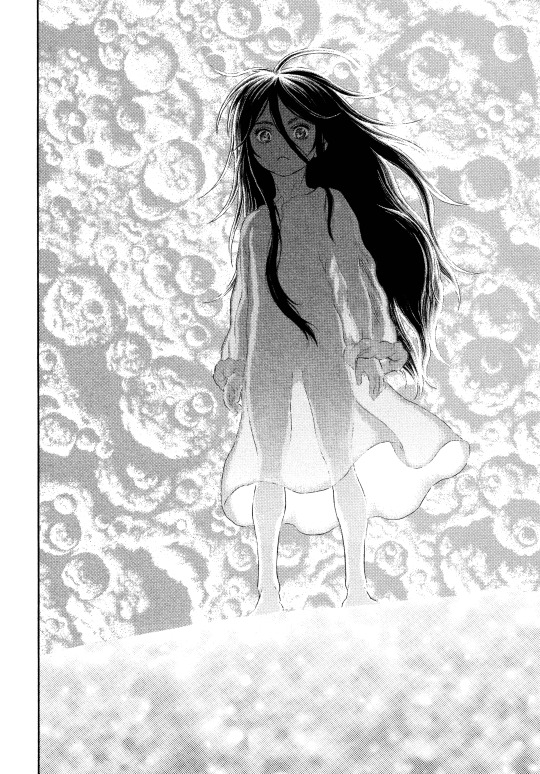
So what or who could possibly kill or have the intention to kill the Moonlight Boy?
A powerful astral force, that means Godhand-/Idea of Evil-Tier and higher
A group of powerful apostles might be a little bit too much for the boy to handle, too (but that depends how effective his abilities are against other apostles - we only saw how he used his abilities against lost souls/wraiths and familiars)
Rakshas could possiby become a threat to the Boy, who did mention to lob Griffith’s head off. We even see him perform an attempt on Griffith’s life in volume 23 (see pic below). If we go by the assumption Femto possesses the moonlight boy’s body, Femto himself would be untouched from the physical body (= moonlight boy) being killed, because he is an astral, not physical entity; which again, for me begs the question: who or what in the fuck is “Griffith” then? I feel like Griffith at this point is just a farce of Femto at this point to get his castle in the sky: #GriffithDoesntExistAnymore ya’ll
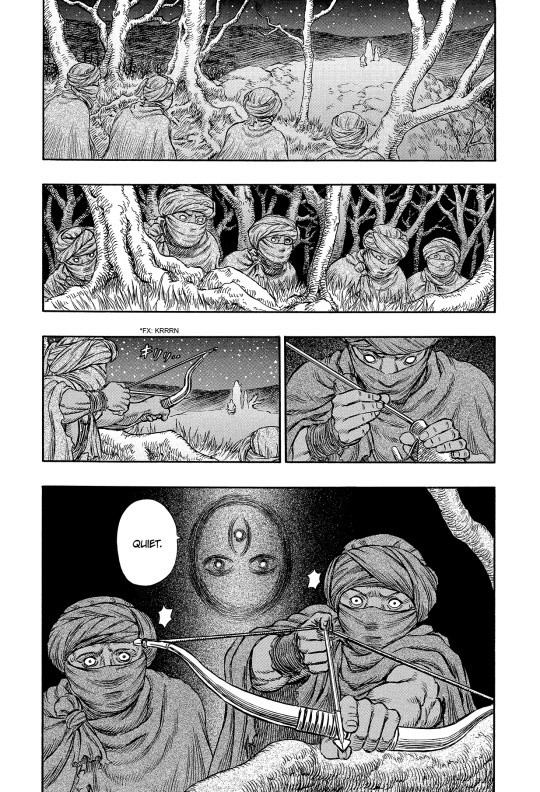
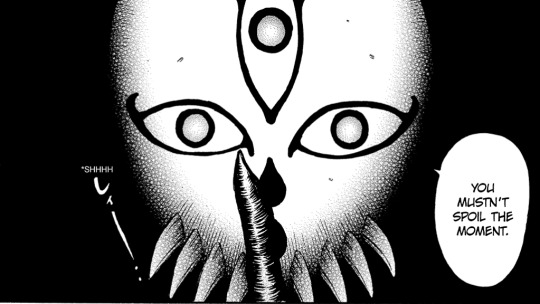
Assuming the moonlight boy is something that is akin to an apostle, the abyss of souls might be able to suck him in too, in a similar fashion to how Guts and the Snail apostle were attracted to it in the Black Swordsman Arc
Last but not least, Guts is also a threat to him as well, because he might still want to go kill Griffith, not knowing Griffith’s body is actually that of his son.
I’m going a lil bit off topic here but the train of thought here might be interesting to some, especially if you have more questions about Moonlight Boy/Griffith/Femto and how that could look like in the finale, so here’s much more babbling below the cut:
Can Femto kill the Moonlight Boy?
I think Femto in principle can do whatever he wants with him, though if he did kill him it’d be of no service for him, at least not now.
It may be different once Femto deems it of no use anymore to appear as Griffith before humankind (e.g. in the event he ascends a level higher into the astral plane, like Ganishka did) - then I can see Femto having a reason to kill the Moonlight Boy.
Can the Moonlight Boy kill Femto?
To answer that question, we must see whether how strong the Boy actually is.
At least, we just by what’s happening in Berserk we do know that they must have very similar powers and abilities:
Manipulation of Mind and Od:
> Femto/“Griffith” showing up as ethereal body (?) before the King of Midland died (this happened before Femto descended from the astral plane during the birth ceremony)
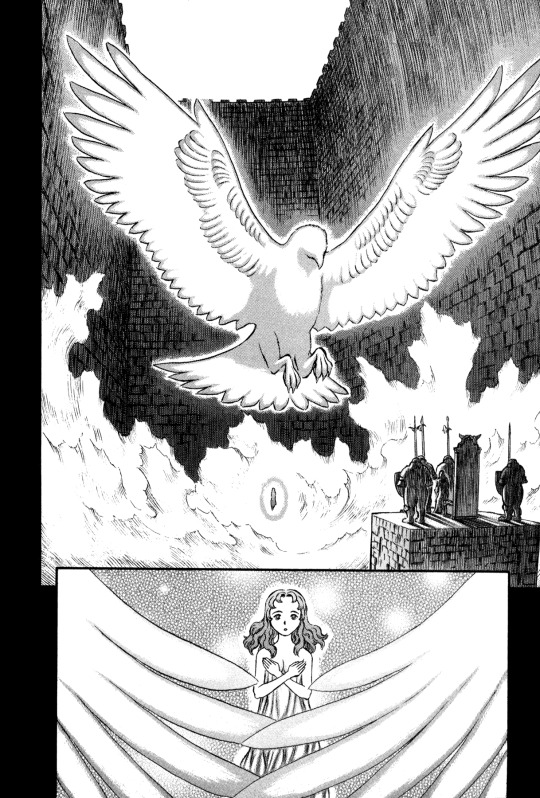
> Femto/”Griffith” showing up as vision in Zodd’s day dream
vs
> The Demon Infant being able to project a dream or vision into Guts’ mind to make him go save Casca (again, this happened before the birth ceremony, so he was completely separated from Femto)

> The Moonlight Boy showing up as ethereal body before Berserker Guts
> The Moonlight boy shooing away a crocodile familiar
Summoning Souls:
> Femto/“Griffith” collecting souls and sending them “back”
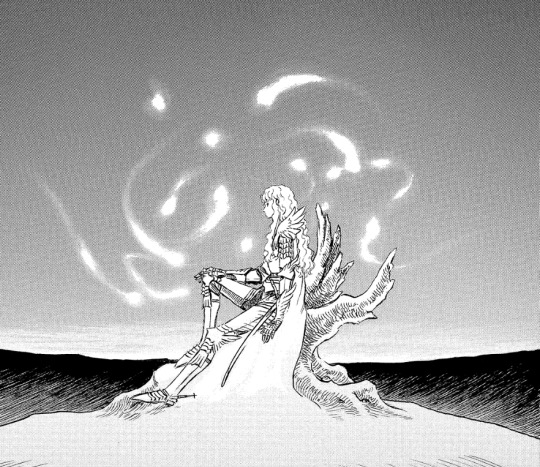
vs
> The Demon Infant controlling the heretics (assuming Demon Infant = Moonlight Boy)
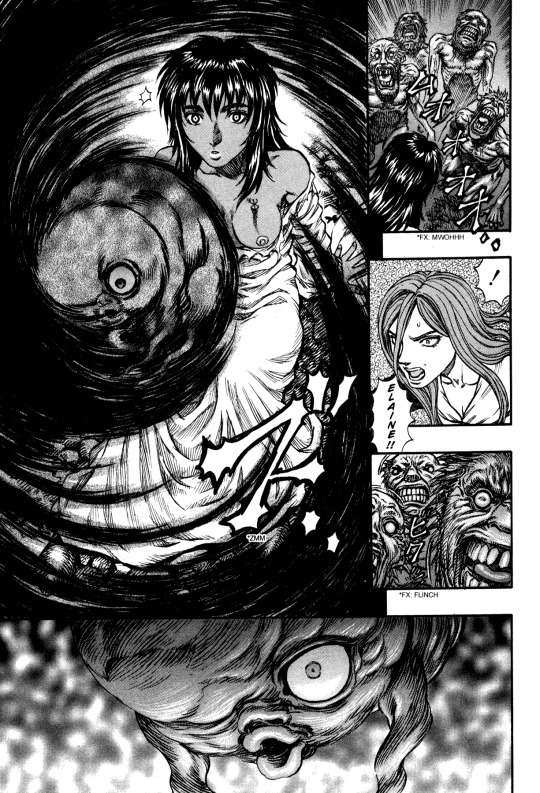
Looking at all of this, this begs the question:
Is Femto only borrowing the moonlight boy’s power (which are similar if not the same as the demon infants’) or is he actually using his own?
Honestly? I feel like Femto is only borrowing them, because we are NEVER actually shown how Femto uses his power in the physical world, mostly because Femto is strictly an astral being, so his area of influence is not in the physical world. When Femto attempts to kill Guts and Casca as Skull Knights saves them during the Eclipse does NOT count, because it happens in an astral dimension. He usually enters the mind of people in the following cases (the ones that I remember on top of my head):
he pays the King of Midland a visit before he dies, assuming what the King saw was “real” and not just a hallucination (= a mere product of his brain)
he cuts off Zodd’s horn in a day-dream or vision in volume 17. This is the only time Femto’s actions have clear consequence in the physical world. And even then, you could argue this was only possible because Zodd is an apostle (aka an astral being that has connection to the astral realm anyways)
For whatever reason, moments before the World Transformation, Femto (not Neo-Griffith!!!!) appears before an ascended Ganishka. This is most intriguing actually - To find out whether that bit happened in the ASTRAL world or the PHYSICAL world, and also find out all its implications, I’ll have to read up and take a closer look!
For the Moonlight Boy to lose his life saving his parents, they must be exposed to great danger. That danger can be various, ranging from mythical/astral beings and apostles to the God Hand members (except Femto), as pointed out above.
Only when Femto/Griffith is located inside an astral dimension, Femto can be killed without harming the Moonlight Boy, or even the Moonlight Boy himself would be possibly able to kill Femto. Meanwhile, the Moonlight Boy is always in danger and his own father might even be a danger to him (cause everyone else thinks Griffith is Griffith and not Guts and Casca’s son; readers included lol). At least, in case Guts will never understand what happened to his own son (I honestly hope Casca will change that).
Consider that…
calling a Behelit does open up an astral dimension, usually depicted in the shape of a tornado (!!!)
The moment the astral dimension is opened via the behelit, Guts WILL NOT hesitate to take his chance to land a strike on Femto. If Guts or Casca get in danger doing so (other apostles pose a major threat) the moonlight boy will very likely save them
as long as Femto is possessing the Moonlight Boy, he will NOT be able to kill Guts nor Casca because of the moonlight boy’s feelings for his parents; it might look very differently if Femto occurs before him in his astral form only, without possessing the Boy. This is when Femto will be able to kill them as he pleases, and this is also when the Boy might lose his life saving them. Eventually, if the moonlight boy is killed, it also effectively destroys Femto/“Griffith”’s dream of the castle in the sky. That’s why for now, it’s in Femto’s interest to keep him alive.
So these following events will likely happen all at the same time:
Guts’ behelit will activate by someone who is close to him at the moment in time (does NOT have to be someone in his party), without necessarily making a sacrifice
Because of the shifting dimensions when making a sacrifice, Guts and Casca get a chance to save their son by killing Femto
The moonlight boy might be able to break free from Femto’s shackles all by himself anyway, if we consider that the moonlight boy has changed (Schierke notes a change of od between the two encounters). If you examine how he might have changed (done in one of the articles I linked above), it seems like as if he is resuming his original form. Is he slowly breaking free from Femto…? Someone activating the behelit might help the moonlight boy break free.
So: Can the Moonlight Boy kill Femto? Perhaps. I mean, I can see him doing it. Will the Moonlight Boy die trying to kill him in an act to save his parents? Yeah, possibly.
The boy attempting to break free or save his parents and dying doing so would be quite a paradox, given Femto would likely be the one that is threatening their lives in the first place (directly or indirectly).
69 notes
·
View notes
Text
The Death of Aileen Wuornos
It was disturbingly easy to watch as the state put Aileen Wuornos to death
Published October 10, 2002 STARKE -- Even for the witnesses, there was no escape. At 9:28 a.m., a guard shut the door we had just walked through and locked it from the inside. All of Florida State Prison was on lockdown Wednesday morning, the exercise yards and work fields eerily empty beneath a low gray sky. All of the roughly 1,200 inmates housed here -- except one -- were in their cells. Now the room where we'd watch Aileen Wuornos die was sealed, too. The guard pointed me to a seat in the last of four rows. There were 29 people in the room, including six relatives of Wuornos' victims, 12 journalists, a state prosecutor and various Department of Corrections officials. We sat ramrod straight, staring at the brown curtain that separated the large viewing window from the execution chamber. Two speakers were mounted on opposite ends of the wall above the window. All was silent, except for the hum of a Friedrich air conditioner set on low cool in the rear corner. We were a captive audience, brought together to witness the aptly bizarre end of a twisted life. We had different viewpoints, different roles, different feelings, but for 20 excruciatingly long minutes, we sat together as a killer was killed. There wasn't an inattentive eye in the house. But after the ritualized pageant was over, after she stiffened and turned blue and two men with stethoscopes leaned over her body and officially pronounced her dead at 9:47 a.m., I didn't feel nearly as disturbed as I would have thought. And that was disturbing in itself. At 9:29 a.m., the curtain opened. Wuornos was strapped onto a gurney, with a needle leading to two intravenous tubes poked into the fleshy bend of her right arm. Her mouth and lips were moving, but we could not hear. The microphone dangling above her was off, our wall speakers mute. Her eyes were open, darting to the side from her restrained head to quickly survey the witness room. "She seemed a little surprised to see so many people," Terri Griffith, who sat in the front row, said later. Her father, Charles Humphreys, was one of seven men Wuornos confessed to murdering. "I know she appreciated the attention." Wuornos was tucked beneath a white sheet, which was folded with military precision under her feet and around her neck and shoulders. She looked like a made bed. The only visible parts of her body: her head and her right arm. Final statement The digital clock on the wall above her changed to 9:30. The microphone was turned on. "Do you have a final statement?" she was asked. "Yes," she said. "I'd just like to say I'm sailing with the Rock, and I'll be back. Like Independence Day with Jesus, June 6, just like the movie, big mother ship and all. I'll be back." She spoke in a barely audible voice, with speech that seemed slurred even though officials said she did not request or receive a sedative in her final hours. I could hardly make out a word, the low volume and air conditioner causing those of us in the back corner to exchange horrified glances and whisper, "What'd she say? I couldn't hear." Later, on the van ride back to the media area, those closer to the speakers helped to reconstruct her words. As to what they meant, nobody could figure that out. "She was off her rocker," Griffith said. "She's totally off the wall," said Wanda Pouncey of Boynton Beach, whose father, Troy Burress, was killed by Wuornos. That conclusion was echoed by British filmmaker Nick Broomfield, who made a documentary about Wuornos and is working on another. He had the final interview with her on Tuesday. After complaining about the "sonic waves" that were controlling her mind, she flipped him off and stormed out of the session prematurely. "She's obsessed and crazed, has totally lost her mind," Broomfield said. "She trusts nobody and is stark raving mad. She's multiple people. Every time I met her, she was a different person." It's a point that Fort Lauderdale attorney Raag Singhal made, to no avail, in a letter to the Florida Supreme Court last month. Singhal represented Wuornos earlier this year, but they weren't on speaking terms at the end. She was found competent to be executed after a psychiatric evaluation last week. I traveled with Singhal to Starke, then found myself boarding the van to the witness room when two journalists didn't claim their spots. As second alternate in the media lottery, I thought I'd be covering this execution from outside. But at 9:30 a.m., when it came time for the matter of the State of Florida vs. Wuornos to reach its conclusion after 12 years, I got to see it for myself. The woman who once said she'd kill again because she had "hate crawling through her system," now had a chemical cocktail coursing through her veins. The executioner, who could not be seen behind a two-way mirror, first released two syringes of sodium pentothol, which rendered her unconscious. Then came two syringes of pancuronium bromide, which paralyzed the muscles, and two syringes of potassium chloride, which stopped the heart. The next 17 minutes were agonizingly slow, and she didn't move a muscle, although her heart fluttered a bit on the monitors until she completely flat-lined. Then the doctors in white coats came out. The curtain was drawn, the door was unlocked and we filed back outside to the vans that would take us back to the rest of our lives. I made it home in time for dinner. Simple ritual No matter how you feel about the death penalty, watching another human being get put to death is not supposed to be easy. But this was all so smooth, so clinical, so antiseptic, that it was disturbingly easy. Too easy for everyone. Victims' relatives thought it was too easy for Wuornos, whose chest heaved once and whose eyes shut before reopening ever so slightly, in tiny slits, after the lethal mix of chemicals pumped through her veins. With vengeance and bloodlust, some relatives said they wanted to see her suffer more, preferably in the electric chair with flames and smoke shooting. It was too easy for Gov. Jeb Bush, who carried out two executions on consecutive Wednesdays a month before an election. Rigoberto Sanchez-Velasco came last week, Wuornos this week. It was an especially distasteful coincidence considering there hadn't been an execution since January 2001 and there are now major constitutional issues concerning the death penalty in Florida that should be sorted out by courts. And it's too easy to say Wuornos was evil incarnate, unrepentant and a willing participant in her own death. She was all those things, but she was also obviously mentally ill. After hearing her final statement and hearing about her bizarre behavior, I don't know how any civilized society can take satisfaction in proclaiming her mentally fit before putting her down like a rabid dog. Outside, somebody later remarked that anyone who kills more than one person is probably inherently insane. Florida has killed 53 people since the death penalty resumed in 1976, administered in a way that often seems arbitrary and unfair. What does that make us?
#aileen wuornos#Serial Killer#death#capital punishment#murder#true crime#tcc blog#tcc blogger#tcc community#tcc family#tcc post#tcc#reblog#real killers#female killer#female murderer#interesting#do not condone
28 notes
·
View notes
Link
Perhaps you know the scene: someone, usually a young person, is facing a grand dilemma. It’s something serious—dire. She’s scared to even talk about it. The stakes are just too high. Perhaps it would involve admitting something about herself she hasn’t come to terms with yet, or that even discussing the issue could have severe repercussions for someone she cares about or any other number of more or less infinite possibilities. But the dilemma isn’t going to go away on its own. She needs advice, or at the very least to talk to someone. So she ends up presenting it as a hypothetical (“say there was this person…”) or that she “has a friend” facing a tough choice. Ironically, she has to provide herself with at least the illusion of distance to take that all-important first step towards actually meeting this problem. This scenario is so typical it’s cliché, but that does not mean it lacks value. In fact, it just might hint at a strategy that could prove incredibly useful right about now. But this is all very broad, so let’s make it a little bit more specific & talk about evil. Specifically, humanizing evil. As you are probably aware, the New York Times took a crack at doing so less than a week ago & it did not go well. At all. But even though the results were a hot mess, their intentions were not off-base. “What we think is indisputable, though, is the need to shed more light, not less, on the most extreme corners of American life & the people who inhabit them,” Marc Lacey wrote in the New York Times’ response to the neo-Nazi fluff piece backlash, and he’s not wrong. There is no comfortable way to discuss the everyday humanity of people who do awful things—the “banality of evil,” as it is often called—but for a whole host of reasons that people more knowledgeable than me on the subject have elaborated, it is an extremely important that we do anyway. Not so that we can excuse their behavior, but precisely the opposite. When evil is only something other people do when evildoers are supposed to look evil—remember the backlash Rolling Stone got their “glam” “rock star” cover photo of Dzhokhar Tsarnaev?—it makes for dangerous oversimplification. I agree with the arguments regarding an over-emphasis on the perpetrators as opposed to those whose lives were taken or irrevocably damaged by these horrific crimes. In the Rolling Stone controversy, there were plenty of commentators who primarily took issue with the magazine marketing Tsarnaev as a “hero” as opposed to primarily arguing that they should have highlighted the victims over the perpetrator. The issue is, of course, that evil can look like a hero, or a cool guy, be present in someone who also helps old ladies with their shopping & recycles & donates money to charity. Well duh, you might be thinking. But this still presents a huge problem in how we understand the evil that directly affects our ability to deal with it. Consider the past few weeks. How many times have friends & colleagues of men accused of sexual harassment & assault presented defenses based on the fallacy that “because X has been a good friend to me & such a nice person & done A, B, & C, there is no way X could have done this terrible thing”? From Lena Dunham defending Murray Miller to David Yates defending Johnny Depp, it’s the same argument. Based on the idea that a person who does something terrible must be so fundamentally different from “good” people that they — knowing an accused person & having not sensed this core wrong-ness from him — are sure that the accused could not have done the terrible thing. In other words, it’s based on nonsense. So yes, we should “shed more light, not less,” on why people do the terrible things they do, the many forms evil can take & how and why poisonous ideologies take root in certain people’s minds. To provide an analogy in a subject I have studied more in-depth; it’s like dealing with a disease. If you don’t understand how the pathogen in question works, attempting to come up with a treatment is like trying to hit a bulls-eye in the dark when you have no idea where the target even is. It’s theoretically possible but highly unlikely. But exploring & coming to understand what makes that pathogen tick is something that must be done carefully. And, partly due to the risks involved, such exploration is often done whenever possible through the use of non-pathogenic model organisms—a solution that serves the same basic function as a conflicted youth presenting her dilemma as that of a friend: the individual in question can take a precautionary step back while still being able to investigate underlying mechanisms. The news has no precautionary step back. It deals directly with real people in the real world & interacts directly with real events as they unfold. And when you start profiling real live neo-Nazis & name-dropping all these actual neo-Nazi leaders & organizations, you are giving them all free press. Not even the cleverest journalist can avoid that. “But it’s bad press,” you might argue. Well, late night TV didn’t emphasize the Trump campaign from its earliest days & CNN didn’t air Trump’s 2015 rallies in unprecedented excess because they thought he was the best man for the job. Their coverage contained no endorsements but it was still coverage. Of course, there’s no way of demonstrating exactly how much all this free press & airtime contributed to Trump’s success but it’s pretty safe to say it didn’t hurt his campaign. Perhaps news media isn’t always the best place to do these explorations. After all, there is an alternative, a place that allows for a step back from the real world while still enabling the exploration and investigation of incredibly important political, ethical & philosophical concerns: fiction. Perhaps we need that step back, the distance & arguably even the limitations provided by a fictional context in order to be able to discuss these matters that are so fundamentally important but incredibly volatile. Cinema, at its best, is in a sense a safe space to feel unsafe & be made uncomfortable. A means through which we can be challenged and challenge ourselves & how we understand & interact with incredibly complex ethical, philosophical & political situations. While I love movies that leave me feeling warm & fuzzy inside, I have chosen to dedicate so much of my time—and my life, really—to cinema because of films that have left me uncomfortable or unsettled, that have challenged my beliefs and ultimately broadened my understanding of both myself and the world. Films like Three Billboards Outside Ebbing, Missouri and Get Out, American History X, and Fritz Lang’s M. Cinema, at its best, is in a sense a safe space to feel unsafe and be made uncomfortable. Movies have the ability to be one of the best, safest, and most accessible ways to foster discussion of hugely important but volatile matters. Fiction filmmakers trying to tackle huge ethical dilemmas aren’t working with real-life neo-Nazis with their own agendas. They aren’t leaving real-life victims in the dark by focusing on the story of the perpetrator. Yes, of course, these stories can still be told exceptionally well or abysmally or anything in between, and there are still stakes, they’re just somewhat lowered. But wait, you might be thinking, what about a film like Griffith’s Birth of a Nation? That one sure did a lot of harm. Well, the thing about Birth of a Nation and others of somewhat of a similar ilk like Triumph of the Will is that they are fiction masquerading as truth. Remember that U.S. President Woodrow Wilson commented that Birth of a Nation, the most successful propaganda film the KKK never paid for, was like “writing history with lightning.” This is utter bullshit, but it did hefty damage nonetheless. What I’m talking about is exclusively fiction that calls itself fiction. There are issues that need discussing and debating, and we need to figure out a way to talk about these matters far more productively than we have of late because the growing polarization that has made it nearly impossible to hold productive discourse is quickly becoming the problem to end all problems. It makes just about every other problem out there even worse. As much as I love movies, I’m not saying they have the potential to cure all the world’s ills. What I’m saying is that they can provide a context in which we can discuss the questions and concerns at the heart of various issues while also taking a step back from them, and that is something we ought to embrace wholeheartedly.
3 notes
·
View notes
Text
Saying goodbye to my hero, Sir Roger Moore. Baby, you were the best!

When I was 15 years old, I wanted to be Roger Moore.
If you saw my bedroom walls back then, you would know. Roger Moore found a place on all four of them. I broke out the Scotch tape to put up full-page magazine photos surrounded by Moonraker trading cards, and of course the Bond film posters. I had Moonraker and The Spy Who Loved Me to start with because those were the films that got me hooked on Roger Moore and James Bond. The For Your Eyes Only poster with those sexy legs came along after a while, and an Octopussy poster went up a few weeks before my high school graduation.
My mother called this the shrine, and she wasn’t far off. Roger Moore was my idol. My teenage life was measured in the two-year periods from one of his Bond films to the next. In between I got my chance to catch up with his two earlier films, Live and Led Die and The Man With the Golden Gun, when they appeared on the ABC Sunday Night Movie. Sure, I was also excited to see the Sean Connery movies for the first time, but completing my Roger Moore 007 experience was more important.
And, oh, that glorious week in the summer of 1980 when a double feature of The Spy Who Loved Me and Moonraker played at Cinema 18! Cinema 18 was Erie’s sleaziest theater; it used to be a porno house. But not even a questionable cinema floor was going to stop me from seeing Spy on the big screen—the way it was meant to be seen!—for the first time.
Also to mark time between films, I scanned magazines for interviews with Roger Moore and the TV Guide listings for talk show appearances. When Roger was on the Merv Griffith or Mike Douglas shows, I sat in front of the television set with my tape recorder running. Every golden word had to be preserved.
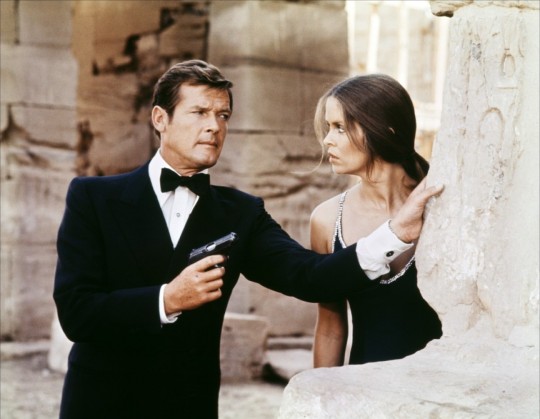
It may sound shallow, but in a large part I am who I am today because I saw The Spy Who Loved Me when I was 13. I’ve written about that momentous first viewing before, but I should point out that Spy was not my first James Bond film. I had previously seen Dr. No, From Russia With Love and most of Goldfinger—the first three Bonds, all starring Sean Connery.
But even though I had seen the films I would later consider Connery’s best, I didn’t connect with him the way I connected with Roger Moore that first time I saw Spy Who Loved Me. So what was it that drew me to Rog? I think that extra bit of cockiness helped. Roger Moore exuded cool invincibility.
The scene that most struck me comes near the end, just as Bond arrives at the oceanic base of the evil Stromberg (Kurt Jurgens). Bond steps inside an elevator with a trap door in the floor. Bond doesn’t know about the trap door, but we the viewers do because Stromberg used it at the beginning of the movie to drop his double-crossing secretary into the shark tank below. The elevator doors close, and Stromberg hits the button to activate the trap door.
The first time I watched this, I was tense. “Oh no!” I thought. I expected Bond to plunge into the tank, where he would fight the shark. But the shark tank on Stromberg’s monitor remained Bond-free. Then the elevator pinged and the door opened and there, to Stromberg’s surprise and mine, was Bond, his feet straddling the trap door. “You were expecting me to drop in,” he drawled.
That was one of those corny lines that sounded so natural coming out of Roger Moore’s mouth. Moore would always undercut his own talent, saying that all he could do was quip and raise his eyebrows, but he made it seem so effortless. If you want proof it’s not easy to deliver a throwaway quip, watch the last two Pierce Brosnan Bond movies. (I don’t like being mean to Pierce, but he got stuck playing Moore half the time and Connery the other half, and the discomfort sometimes showed.)
What I grew to admire above all else about Roger Moore was that he was suave. I wanted to be suave. I wanted to charm ladies with that kind of a deep, smooth voice. I wanted to put on a tuxedo and saunter into a tony nightspot on the Cote D’Azure. I wanted to go to a Cordon Bleu restaurant and order red wine with anything but fish (OK, I did learn a thing or two from Connery.) I never got to do any of those things, but I did teach myself to raise my eyebrow RM style.
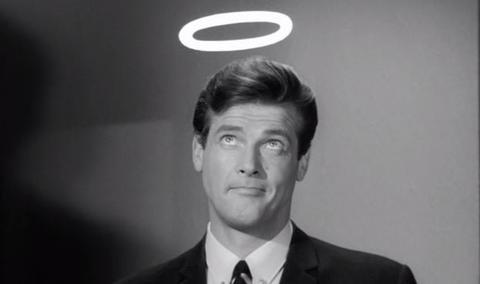
One of the benefits of being a Roger Moore fan in the early ‘80s was, thanks to the popularity of Spy and Moonraker, CBS started showing reruns of The Saint late nights during the week. This was my chance to get acquainted with Roger’s other signature role, and I grew to love Simon Templar nearly as much as James Bond and the works of Leslie Charteris soon joined those of Ian Fleming on my bookcase. However, because these episodes ran late on school nights, I tended to fall asleep in the last 15 minutes. I used to joke I had the endings to about a dozen Saint episodes locked in my subconscious. Several decades later I bought the DVD box set to finally learn how those episodes ended.
But it also wasn’t easy being a Roger Moore fan in those days, believe me. We had to contend with the older generation of 007 fans, the ones who condemned Roger Moore for committing the mortal sin of not being Sean Connery. The divide between Connery fans and Moore fans ran deep (nobody really talked much about George Lazenby back then). We Moore fans were constantly told we weren’t true Bond fans, as if we were less able to appreciate Ian Fleming’s novels because we came of age when Roger Moore was carrying the Walther PPK. The early James Bond fans clubs were run by people who hated Roger Moore and let us know it with every newsletter. The only book on the Bond films at the time, simply titled The James Bond Films, was written by a guy, John Brosnan, who also hated Roger Moore but had to grudgingly admit Spy was pretty damned good.
Time and three subsequent Bond actors have made this issue largely irrelevant, but things were heated when I was young and I admit I still have a bit of a chip on my shoulder. I probably don’t appreciate Sean Connery as much as I should because of it, but, truly, I don’t dislike any Bond actor. I appreciate what each of them has brought to the role. I just appreciate Roger Moore best.
When pushed hard enough, I would defend Moore’s Bond as more than a smooth quip machine. It would have been easier if Moore himself had been on my side. A master of self-deprecation, Moore would insist in interviews he never took Bond seriously. Asked how he made acting choices as 007, Moore would reply, “Sometimes I wear a white dinner jacket and sometimes I wear a black one.”
Despite his protestations, Roger Moore did take Bond seriously. He may be remembered for the grins and the one-liners, but he had his tough and poignant moments as well. Listen to calm, assured way he tells Melina, “We’re not dead yet,” before they are keel-hauled in For Your Eyes Only. Watch how he winces when Anya Amasova mentions his deceased wife in Spy. Look at the anger in his face when he discovers General Orlov’s plot to kill thousands with a nuclear blast in Octopussy. These aren’t the only moments. The insouciance Moore projected was what first attracted me to his 007, but on the proper occasion he knew how to make Bond human rather than superhuman.
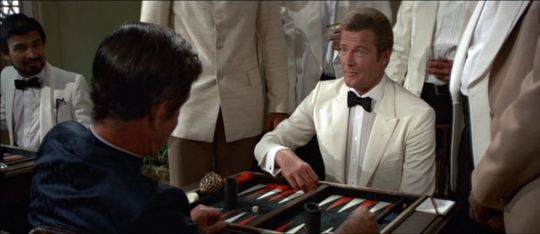
This leads me to Roger’s greatest 007 moment. It’s one that, curiously, won’t make many of the tribute compilations you can find online these days. It is a moment when he is at once smooth and steely and I can’t imagine Connery playing it so well (sorry, chip on my shoulder). You’ll find it near the beginning of Octopussy—the film containing Moore’s best performance, if you ask me—as Bond first confronts the villain, Kamal Kahn (Louis Jourdan, a dark reflection of Moore’s elegance) at the backgammon table.
Bond’s sharp eyes have caught Kahn cheating with a pair of loaded dice that come up double six when needed. Bond takes the seat across from Kahn and raises the stakes by betting the film’s MacGuffin, the Faberge egg. If Bond rolls anything but a double six, he loses. Bond connives to take control of Kahn’s dice, gives his opponent a cold stare, rolls the dice and—still locking eyes with Kahn—declares, “Double sixes.”
When I first saw Octopussy my good friend and fellow Moore Bond fan Brian Sheridan was seated next to me. “Whoah!” Brian said under his breath, “He didn’t even look down!” We knew we had just seen Roger Moore put proof to an earlier theme song: Nobody does it better.
I went to college and my Roger Moore posters came with me. Dorm rooms need decorations too. A new poster went up as Roger departed Bond with A View to a Kill—one film too late, but we’ll leave it at that. Another fellow came along, and a poster declaring Timothy Dalton as “The Most Dangerous Bond. Ever.” appeared on my wall shortly before I graduated Marquette University.
Roger Moore was no longer James Bond, but I was still his fan. Apartment walls also could use a few movie posters, I found. The burgeoning home video industry meant I could watch his movies pretty much whenever I wanted.
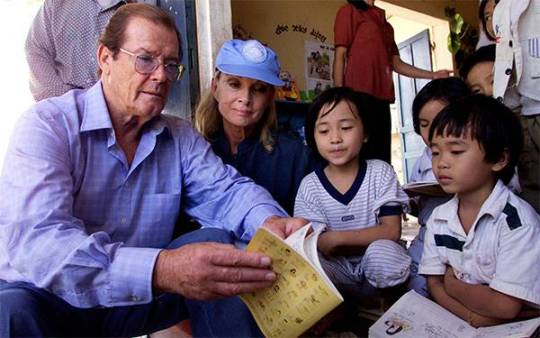
At the urging of his friend Audrey Hepburn (my all-time favorite actress), Roger Moore became a goodwill ambassador for UNICEF, and I found a new reason to admire him. He didn’t show up on the screen much anymore, but stories of his generosity continued.
When Pierce Brosnan’s first Bond movie, GoldenEye, was released in 1995 I was reading a magazine article about its production. One of the crew members interviewed for the story went off on an unexpected tangent. He said that the Bond film family, the regular crew that Cubby Broccoli had employed for decades, dearly missed Roger Moore. He treated everyone on set, from his co-stars to the grips, as mates and kept them all laughing. As improbable as it may sound, he said, a lot of the regulars would have loved to see Moore return as Bond.
Testimonials like that became common. It seemed no one who had ever worked with Roger Moore spoke an unkind word about him. Sometimes people would go out of their way to praise him. In a career retrospective for the AV Club, actress Nancy Allen started gushing—quite to her interviewer’s surprise—about working with Moore on a mostly forgotten TV movie called The Man Who Wouldn’t Die.
Although Moore was becoming more and more obscure on this side of the Atlantic, I could tell from press reports that the elder Moore was now regarded as a national treasure in the UK. After Desmond “Q” Llewellyn died in 1999, Roger gracefully stepped into the role of unofficial spokesman for the Bond franchise. When Roger became Sir Roger in 2003, I cheered.
In his later years, Sir Roger Moore became something of a magical person. Warmth and kindness and humor just seemed to flow from him. His tweets were hilarious, though he never missed an opportunity to raise consciousness about his beloved UNICEF. His speaking tours of the UK were interspersed with press reports of him grabbing a meal at a local restaurant, or even showing up at a pharmacy, and regaling everyone he met. It cheered my heart to see that my childhood hero was, by all accounts, simply a wonderful person.

In 2012, a dream came true for me. When Moore was promoting his latest book, Bond on Bond, to coincide with the 50th anniversary of the 007 films, I had the opportunity to interview him for the Chicago Sun-Times. It was just a phone interview, alas, but I still got to talk to my hero of 34 years. He was as warm and funny and gracious as I had hoped as we talked about kicking the car off the cliff in For Your Eyes Only and pulling pranks on Desmond Llewellyn. He broke my heart a bit when I asked about the Lotus Esprit from Spy Who Loved Me (still my dream car) and he said he didn’t like it. “My legs are too long.” Still, when I hung up the phone I was thrilled. It was one of the happiest days of my life. And when I concluded the conversation, I was careful to say, “Thank you for being my idol.”
Those words came back to me the morning of Tuesday, April 23. I had just arrived at the YMCA and wanted to take a quick look at Facebook before heading to my 8:15 aerobics class. Instead of the usual Snoopy cartoon, I got punched in the face by the first report of my hero’s death. I was angry at first. There were no other reports yet, so I assumed it was a hoax even though the source, the London Standard, sounded trustworthy enough. I went straight to Roger’s Twitter page, hoping to find a tweet saying, “Relax. I’m still alive.” Instead I found the statement from his children, and I knew it was real. My childhood hero was gone.
I didn’t make it to my aerobics class. I couldn’t look away from my phone as the tributes trickled in. I was grateful there was a box of Kleenex nearby in the lobby.
Several days have passed, and the Roger Moore tributes have continued. I was fortunate to participate in one on the Spybrary podcast. But of all the words said and written about Roger Moore since he passed, the ones that most struck me came from Ian Ogilvy, who succeeded Moore as Simon Templar in Return of the Saint. In a Facebook post, Ogilvy wrote: “If everybody could comport themselves in the style of Roger Moore, who was beloved by everybody and hated by none, the world would be a nicer place.”
When I was in high school, I imitated Roger Moore because he was suave. Now I plan to imitate him because he was good.
I am 51 years old, and I still want to be Roger Moore.
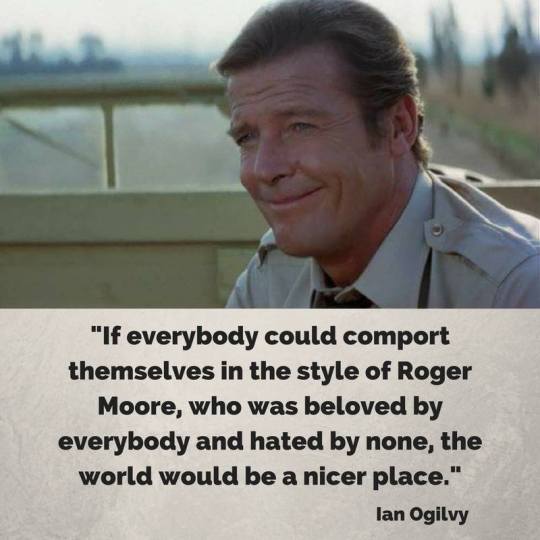
#Roger Moore#Roger Moore remembered#James Bond#007#The Saint#Simon Templar#UNICEF#Sean Connery#Pierce Brosnan#Ian Ogilvy#Live and Let Die#The Man With the Golden Gun#The Spy Who Loved Me#Moonraker#For Your Eyes Only#Octopussy#A View to a Kill#RIP
4 notes
·
View notes